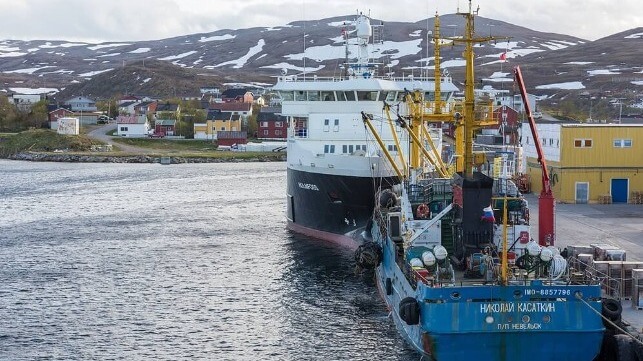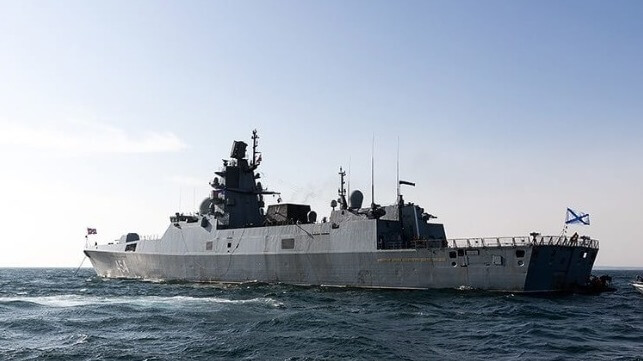Norway Expels Russian Fishing Vessel for Security Reasons

Norway has expelled a Russian fishing vessel that overstayed its welcome at the Port of Batsfjord. The decision was made in a King-in-Council meeting held on December 6, and lawmakers cited security reasons.
The 39-meter-long vessel Azurit has been moored in Batsfjord since May, but the reasons for its prolonged stay are unknown. But some media reports indicate that a Norwegian firm, Indistrikulde AS, had done repair works on the vessel at a cost of $96,000. The amount was yet to be cleared, leading the vessel to be detained. The government has however instructed that no public or private claim should hinder the vessel from leaving the port.
Azurit is registered to the Russian company Oceanprom, with St. Petersburg as its home port.
“The captain/shipowner is ordered to ensure that the vessel Azurit has left the Batsfjord Harbor within five business days after this decision is announced. If the vessel will not have left the harbor within the issued deadline, Norwegian authorities are ordered to tow it out to sea,” said a statement from the Norwegian government.
However, ship tracking sites show that Azurit is yet to depart from Batsfjord as of Saturday morning. The Norwegian newspaper Barents Observer reported that the captain of Azurit was notified of the expulsion order on December 9. On this basis, the Finnmark county Deputy Chief of Police, Trond Nilsen, said that the count for the five days’ grace period started when the captain was notified.
“So, from Saturday the 14th, we have the authority to take the needed action,” Nilsen told the Barents Observer.
In October 2022, Norway limited Russian fishing vessels to just three of its ports - Kirkenes, Batsfjord and Tromsø. This was part of Norway’s economic sanctions against Russia for invading Ukraine. In July, Norway further introduced tougher regulations on Russian fishing vessels landing catch in the three ports. The new regulations included time limits, with Russian vessels allowed a maximum of five working days at any port. In addition, the vessels would face increased scrutiny from the customs, the police and the Armed Forces. Specifically, Norway said it would increase police activity in the port of Batsfjord, and ensure the customs service and the police share information more closely.
Norway and Russia jointly manage the rich fish resources of the Barents Sea, with Båtsfjord as a key landing port.
Top image: Port of Batsfjord (Joachim Kohler / CC BY SA 4.0)
Russia's Shadow Fleet Tankers Could Get Naval Escorts

Days after six NATO members agreed to start checking the insurance paperwork of Russia's "shadow fleet" of tankers, Denmark's military intelligence service warned that Russia may begin dispatching naval escorts to follow along with these high-risk vessels.
Since the G7 "price cap" restriction on Russian oil shipping took effect in late 2022, Russia has built up a fleet of anonymously-owned, questionably-regulated tankers, thereby minimizing exposure to Western restrictions on its oil exports. As these gray-market ships cannot obtain cover from the well-capitalized insurance markets in Europe, coastal states in the Baltic - like Denmark - are uncertain whether the shipowners would be able to pay claims in the event of a major spill. The risk of pollution is amplified by the shadow fleet's high average age, uncertain management and tendency to avoid pilotage.
On Monday, six NATO nations with coastlines along Russia's Baltic and North Sea oil shipment route - the UK, Denmark, Sweden, Finland, Poland and Estonia - agreed to ask shadow fleet tankers for proof of insurance at key transit points, Estonian Prime Minister Kristen Michal announced Tuesday. If the tankers do not answer the request, the non-response "will be assessed and addressed in coordination with our international partners," he said.
On Wednesday, the Danish Defense Intelligence Service cautioned that rising tensions in the Baltic could prompt Russia to assign naval escorts to its controversial tanker fleet, further increasing friction between NATO and Russian forces. Other likely Russian actions in the Baltic Sea could include more GPS jamming - already a serious issue - and other electronic warfare activity.
"We may also see Russia appear more threatening to Denmark and other NATO countries' military aircraft and ships. This entails a risk of misunderstandings and minor collisions between boats in the Baltic Sea," the agency warned.
That risk may also extend to the Arctic, an area of increasing strategic importance. "Russia will demonstrate strength in the region through aggressive and threatening behavior, which will entail a greater risk of escalation than previously seen in the Arctic," warned the Danish Defense Intelligence Service.
No comments:
Post a Comment